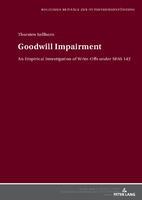Goodwill Impairment
An Empirical Investigation of Write-Offs under SFAS 142
Abstract
In 2001, goodwill amortization in the US was eliminated in favor of an impairment-only approach, which, according to critics, gives managers vast discretion and opportunities for earnings management. Prior research suggests that discretionary asset write-offs are associated with economic factors and managers’ financial reporting objectives. Based on a systematic literature review, this study investigates for a comprehensive sample of US firms the determinants of goodwill write-off behavior. Regression analysis shows that write-off behavior is significantly explained by firms’ economic properties. Only in large, high-profile firms, incentives appear to be significant determinants. These findings suggest that the impairment-only approach does capture goodwill impairment at least to some extent.
Keywords
Bilanzpolitik; Empirical; Firmenwert; Generally Accepted Accounting Principles; Geschäftswert; Goodwill; Goodwill; Impairment; Impairment; Investigation; Offs; Sellhorn; SFAS; under; USA; US-GAAP; Wertberichtigung; WriteDOI
10.3726/b14014ISBN
9783631754986OCN
1082943952Publisher website
https://www.peterlang.com/Publication date and place
Bern, 2018Series
Bochumer Beitraege zur Unternehmensfuehrung, 70Classification
Accounting: study and revision guides
Budgeting and financial management


 Download
Download